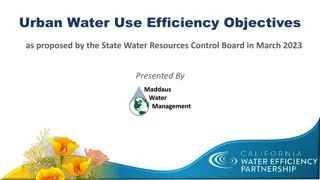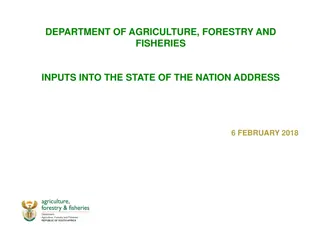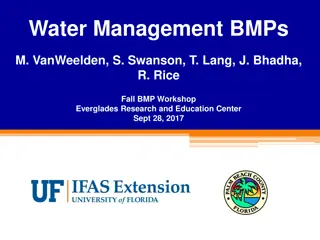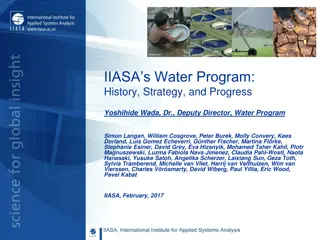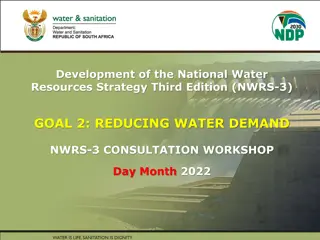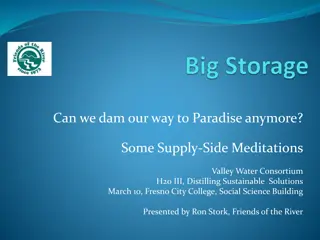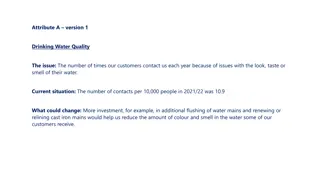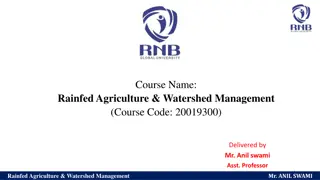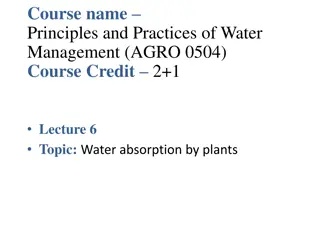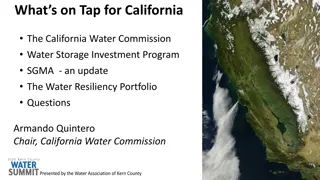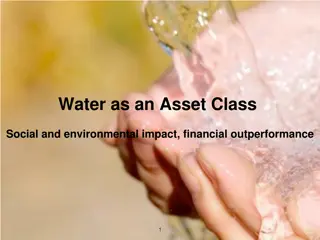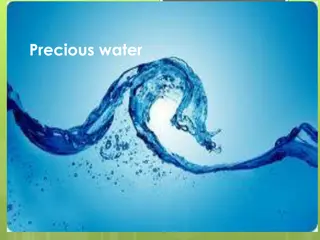Challenges and Importance of Water Management in Agriculture
Sustainable water management is a crucial challenge globally due to population growth, urbanization, and industrialization. Irrigation plays a vital role in agriculture, aiding in increased production and efficient resource utilization. However, improper irrigation practices can lead to water wastage, soil degradation, and productivity losses. India, facing a water crisis, emphasizes the need for effective water management to sustain agriculture and address declining groundwater levels.
Download Presentation

Please find below an Image/Link to download the presentation.
The content on the website is provided AS IS for your information and personal use only. It may not be sold, licensed, or shared on other websites without obtaining consent from the author. Download presentation by click this link. If you encounter any issues during the download, it is possible that the publisher has removed the file from their server.
E N D
Presentation Transcript
Course name Principles and Practices of Water Management (AGRO 0504) Course Credit 2+1 Lecture 1 Topic: Water and its role in plants; Irrigation: Definition and objectives.
Introduction Sustainable management of water is an increasingly complex challenge population, growing urbanization, and rapid industrialization combined with the need for raising agricultural competing claims for water. There is a growing perception of a sense of an impending water crisis in the country. development and efficient in India. Increasing production generates
importance The importance of irrigation in the world is well stated by N.D. Gulhati of India: Irrigation in many countries including India is an age-old art as old as civilization but for the whole world it is a modern science science of survival .
After independence, production registered nearly 4.52 times increase from around 50.8 million tons in 1950-51 to about 230 million tons in 2007-08. This has been mainly attributed to three factors viz., high yielding cereals, expansion of area under irrigation and fertilizer use. Irrigation may be considered as the major factor agriculture as it aids in efficient use of costly fertilizers and other inputs besides meeting crop water needs. of modern intensive
On the other hand, improper irrigation causes wastage of large amounts of water, leach mineral nutrients from the root zone into the deeper layers contaminating groundwater, and impairs the productivity of soil, or yield losses may occur if insufficient water applied. Excessive application of water causes water logging and increase high water tables or seepage spots to develop which may be corrected only by expensive drainage systems. In addition, salts accumulate and an alkali soil may develop. the construction of
India, with a population of over a billion is the worlds largest democracy, historically, civilization in India as around the world have largely evolved and developed around water bodies as most human activities, including agriculture and industry depend on water. The water situation in India seems to be going from bad to worse. Not only is there a growing scarcity of water in the country, the agriculturally important states like Punjab, Haryana, Tamilnadu and Rajasthan are facing a steady fall in their ground water levels. While the per capita availability of utilizable water in India in 1951 was 3,450 cubic meters in 1999 it came down to 1,250 cubic meters. This according to the Ministry of Water Resource is expected to decrease to 662 cubic meters per person in 2050.
Rain Evapotranspiration I I I I I I D D D Seepage I I Percolation S P Groundwater inflow Recycling pump Groundwater Outflow Tubewell/pump
UNIT - I Water and its role in plants To add water to the soil for supplying moisture essential for normal plant growth and development To provide crop insurance against short duration droughts To leach or dilute excessive salts in the crop root zone, thereby providing a favourable environment in the soil profile for absorption of water and nutrients To soften tillage pans To cool the soil and atmosphere, thereby making more favourable microenvironment for plant growth
Irrigation Definition It is generally defined as application of water to soil for the purpose of supplying the moisture essential for normal development . In other words it is the human manipulation of hydrological cycle to improve crop production and quality and to decrease the economic effects of drought. However, a broader and more meaningful definition is that irrigation is the application of water to the soil for the different purposes plant growth and
Objective To reach the principles of water management and practices to productivity. a) To increase crop production on sustainable basis where water is b) Modification of soil & climatic environment c) To mitigate i.e., lessen the risk of catastrophes caused by drought d) To increase population of arid and sparsely populated areas e) National security i.e., self sufficiency in food grain production enhance the water







